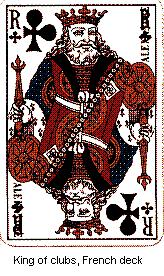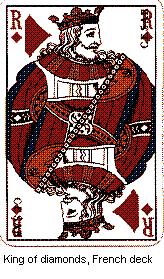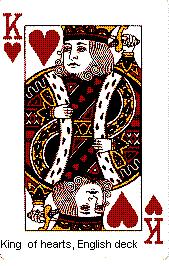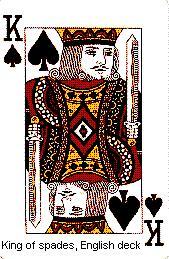K
K
(n) Abbreviation for a king, usually found only in written text about cards. K♦, for example, is the king of diamonds.
“Ka-ching.”
(n) “Ding.” From the sound of a cash register.
Kankakee
(n) A poker game played only in private or home games, a form of seven-card stud with a communal card, in which the joker (completely wild) is turned face up in the center of the table, where it becomes part of every active player’s hand.
Kansas City
(n phrase) 1. Kansas City lowball, that is, deuce-to-seven. 2. In ace-to-five lowball, the specific hand 7-5-4-3-2; so called because that is the best hand in Kansas City lowball. 3. In ace-to-five lowball, when used attributively with a rank, generally means that card plus 5-4-3-2. For example, a Kansas City 8 is the hand 8-5-4-3-2.
Kansas City lowball
(n phrase) Deuce-to-seven.
Katie
(n; imitative) In hold’em, K-T as starting cards.
Katy
(n; imitative) In hold’em, K-T as starting cards.
K-boy
(n) King (the card).
keep a kicker
(n phrase) See kicker (definition 4).
(n phrase) A form of five-card stud, found only in home games, a high-low game in which, after each player has been dealt one downcard, each player gets a choice, in order, on each succeeding card. When each player has one downcard, there is a betting round. The dealer then offers a card off the deck to the first player. If the player wants that card, he keeps it. If he does not want it, he immediately gets the next card off the deck, and the first card is offered to the second player, who has the same options. He can take the card, or immediately get the next card off the deck, in which case the spurned card is offered to the third player, and so on. This continues until everyone has one upcard, at which point there is a second round of betting. Any card that goes all the way around the table without stopping at anyone, including the dealer, becomes dead. After the betting has been equalized, the operation starts all over, with a card being offered in turn to each player. After each time of each active player having the same number of upcards, another round of betting ensues. After each player has four upcards, each player has the opportunity of replacing an upcard with an upcard, or the downcard with another downcard (the twist), followed again, of course, by another round of betting, and then a declaration, and then the determination of the two winners. The game has high dealer advantage. This game is sometimes called take it or leave it, shove ’em along, or push. It is also sometimes called pass the trash, although that name is more often reserved for Anaconda.
(v phrase) Make sure someone is not bluffing, with respect to calling. “Well, I know you’re not bluffing, but I’ve got trips, so I’ll keep you honest.” See honest (definition 1). Related to pay off.
keep [someone] in line
(v phrase) Raise an aggressive player to keep him from running over (see run over) you.
kelter
(n) Kilter.
Kem
(n, adj) A brand of plastic cards; usually followed by deck or cards.
key hand
(v phrase) A significant hand that marks a reversal in fortunes, changes the way things were going, or is the most important hand in a session or tournament.
keyzard
(n) A card, particularly the card someone needs; comes from Sacramento cardroom double talk. When drawing a card in lowball, a player might say, “That’s the keyzard.”
(vi, vt) Watch someone play, or stand and watch a game, often from the rail.
(n) One who watches, but does not participate in, a poker game (often offering unsolicited and unwanted comments on the ongoing action); onlooker; railbird. Also called lumber, wood, or sweater.
kick
(v) 1. Raise. “I’ll kick it” means “I raise.” For this meaning, bump is sometimes used, but generally only in home games or by beginning poker players. 2. Hit a kicker on the draw (in draw poker). “My kicker kicked” means I drew two to a pair with a kicker and hit that kicker. If you draw to a pair of kings with an ace and make two pair, aces and kings, you kicked.
(n) 1. In hold’em, the unpaired card that goes with a player’s pair or three of a kind. Often, the rank of the kicker determines the winner of the pot. For example, if you have A♣ K♥, and I have K♠ Q♦, and the board is K♣ J♦ 7♠ 5♥ 2♦, you win; your pair of kings with an ace kicker beats my pair of kings with a queen kicker. 2. In hold’em, the unpaired card that accompanies a player’s higher hole card. For example, if you have A-Q, the queen is the kicker. 3. In draw poker, a side card (one of a different rank) held, when drawing, with a pair or three of a kind, to disguise the hand or to try to improve the hand. Often thekicker is an ace. For example, a player opens with two kings. At the draw, the player keeps an ace with the two kings and requests two cards. The player hopes to fool the others into thinking he has three of a kind, and also hopes to make two pair, aces and kings. (This particular player doesn’t fool anyone; if hereally had three of a kind, he would have drawn one card — again keeping a kicker. He also has decreased his overall chances of improvement; drawing three to a pair improves the hand more often than drawing two to a pair with a kicker.) 3. Side card (definition 2).
(n phrase) In hold’em, when two players have the same pair formed by a hole card matching one on the board, the one with the smaller side card is said to have kicker trouble. For example, on a flop of A-10-5, a player with A-J has kicker trouble against any A-K or A-Q hand. Unless a jack hits (or both a king and queen come in the next two cards), the A-J hand will lose.
Kid Dyne-o-mite
(n phrase) Kid Dyno-mite.
(n phrase) In hold’em, J-J as starting cards. JJ on the TV show Good Times always used to say “dyne-o-MITE!” Sometimes rendered Kid Dyne-o-mite.
(v) 1. Overblind (definition 1), or sometimes just blind (definition 3). “I’ll kill it” means the pot has probably already been blinded and I’m putting in another blind that is (in a no-limit game at least twice and in a limit game exactly twice) the size of the largest blind already in. Less often to kill means to blind a pot that does not yet have a blind. 2. Deliberately make a hand dead (definition 3) by a dealer prior to exposing the hand when requested by a player. This is so the hand can be shown without causing any possible arguments that the hand might be legally entitled to the pot because it is still live (definition 7). For example, John bets on the river in hold’em, and Sue calls. As soon as Sue puts her chips in, John discards his cards unshown, indicating that he was bluffing and any hand that can call has him beat. Willie, however, wants to see the hand, perhaps because he wants to get a line on John’s play, and says to the dealer, “Turn that hand up.” Since John’s was a called hand, the dealer must, by the rules in most cardrooms, expose the hand. He picks up John’s cards, taps them against the discards (thus killing the hand), and only then turns them face up. — (n) 3. Overblind (definition 2) or blind (definition 1), that is, the act of killing a pot or the chips represented by that act. “It was already $40-to-go and he put a kill in” means he made it $80 minimum bet. 4. Win a lot of money from a game or a specific opponent. “He’s been killing the $20-$40 lately.” “Chloe’s been killing me all evening.”
-kill
(adv) See -blind.
kill a game
(v phrase) Do extremely well in a game, winning more pots than even excellent luck and skill combined would dictate.
kill blind
(n phrase) Kill button.
(n phrase) A button designating who has or must kill (definition 1) the pot.
(n phrase) A pot that has been killed. See kill (definition 1).
(n phrase) A game that has kill pots. See kill pot.
kill one’s/your action
(n phrase) See kill the action.
(n phrase) To stimulate action, some games require a player winning two pots in a row or the winner of a scoop pot to kill the next pot. That pot is called a kill pot. Kill pot also refers to half kill. A game with kill pots is called a kill game. Also see leg up, scoop.
(n phrase) Not make as much on a hand as the cards warrant due to the way in which one played the hand. For example, if, in a big bet game, someone limps in early position and then reraises when raised, that often indicates that the player so doing has a big hand, and he will likely not get much action for the rest of the hand. The reraise is likely to fold others in the pot, including the original raiser, or at least cause opponents to tread warily. Such a play is said to kill the action. Also, kill one’s/your action.
(n) In draw poker, a nonstandard hand sometimes given value in a private or home game. The hand is different in different parts of North America. One variant is any hand containing a 9, 5, and a 2, with one card between the 9 and the 5 and another between the 5 and the 2. This particular hand is also called apelter or a skeet. Another variant is a hand with no card higher than a 9, no pair, and no four-flush or four-straight. Another is a sequence of cards, each separated by one rank, such as 2-4-6-8-10 or 5-7-9-J-K. This particular hand is also called an alternate straight, Dutch straight, or skip straight. The kilter generally ranks between three of a kind and an “ordinary” straight. Sometimes rendered kelter.
king
(n) A face card, the one that ranks between the queen and the ace, of which a standard deck contains four, one each in the spades (♠), hearts (♥), diamonds (♦), and clubs (♣) suit.
(n phrase) In hold’em, K-3 as starting cards. So called because a 3 looks a bit like a crab. Also called Alaska hand.
king high
(n phrase) 1. In high poker, a no pair hand whose highest card is an king. “I have king high; can you beat that?” (Also, “I have a king high; can you beat that?” The difference is that word “a.”) “Yeah, I got ace high.” 2. In low poker, a hand topped by a king.
king-high
(adj) A term that often modifies (refers to) a straight or flush topped by an king. “I was drawing to a king-high flush, but all I made was a king high.”
(n phrase) King (the card).
(n phrase) A full house consisting of three kings and a pair.
(n) A face card. In the English deck, the figure faces forward, tilted to the left. He holds a sword in his left hand. In the French deck, the figure faces forward, tilted very slightly to the right, holding in his left hand a scepter with something that looks like a shield attached below it. The index is R, for roi, the French word for king. Known in the French deck as Alexandre.
(n) A face card. In the English deck, the figure appears in profile, facing to the left, with one hand sticking up in front of him, seemingly coming out of his shoulder. An axe appears behind his head. Often known as the one-eyed king. In the French deck, the figure appears in profile, facing to the right, with no distinguishing attribute, and no visible hands. The index is R, for roi, the French word for king. Known in the French deck as César.
(n) A face card. In the English deck, the figure faces forward, tilted very slightly to the right, and holds a sword. Unlike the other kings, he does not have a mustache (and thus is sometimes known as the king without a mustache). He appears to be sticking the sword into his head, whence originates his sobriquetthe suicide king. In the French deck, the figure faces forward, tilted very slightly to the right, and holds a sword. The face has a full mustache. The index is R, for roi, the French word for king. Known in the French deck as Charles.
(n) A face card. In the English deck, the figure faces forward, tilted to the right. He holds a sword in his left hand. In the French deck, the figure faces forward, tilted very slightly to the left, and holds a scepter, while a harp (David’s instrument in the Bible) appears below his scepter. The index is R, for roi, the French word for king. Known in the French deck as David.
kingpots
(n) A form of high draw poker, usually found in home games only, in which a player cannot open the pot without holding at least two kings as openers. Compare with jackpots.
kings over
(n phrase) 1. Kings up. 2. Kings full.
(n phrase) Two pair, the higher of which are kings.
(n phrase) King of hearts. Use of this term is usually reserved for naming of wild cards by the dealer in a dealer’s choice home game, as, for example, “Five draw, deuces and the king without a mustache wild.” Also, man without a mustache.
kitchen game
(n phrase) A home game, usually one with small stakes.
(n phrase) A home game, usually one with small stakes.
(n) 1. In a private or home game, a cash reserve or collection built up by taking a specified amount out of each pot. The kitty belongs to all the players, and is usually collected for some special purpose, such as paying the host of the week’s game for the use of his home, for refreshments, sending one of the players to a tournament in Nevada, and so on. 2. The pot; often as part of the phrase feed the kitty, which merely means call a bet. 3. In various forms of poker played only in private or home games, a small packet of cards set aside at the start of a hand that may be purchased by or otherwise made available to one of the players, according to the rules of the specific game. 4. In a private or home game, a cash reserve or collection built up either by intermittent contribution, such as an amount put aside, say $20 by each player, to be awarded to the first player to win, for example, two pots in a row, which amount then is replenished, or by a contribution each hand, which again builds up for a specific similar accomplishment. Compare with premium.
KKK
(n) Ku Klux Klan, that is, three kings.
knave
(n) Jack (the card). The term is becoming obsolete.
(v) 1. In draw poker, at the time to draw cards, indicate that one is pat. So called because a player, if he has a pat hand, often knocks on the table with his knuckles when it is his turn to announce his draw. Also, knuckle, rap. 2. In any form of poker, at the time for making a bet, indicate that one declines to bet; check. 3. In knock poker, request a showdown. 4. When one is offered the deck by the dealer to cut, after shuffling, rap on the deck to indicate one is declining the option of cutting the cards. For definitions 1 and 2, a player may say in turn “I’ll knock.” — (n) 5. The act of performing any of the preceding. “When it was his turn to bet, he gave it a knock.” 6. See knock poker.
knock heads
(v phrase) Play head up. May imply two players who regularly seem to end up fighting it out for the same pots. “How come you and Jane are always knocking heads?”
knock out
(v phrase) 1. Eliminate a player from a tournament, or be eliminated. “He knocked Matt out.” “Norman was knocked out in tenth place.” 2. In a cash game, bust an opponent. “David knocked Logan out of the game.”
(n phrase) A combination of rummy and poker, usually played at home games by two to four players while waiting for a “real” poker session to start. As in draw poker, each player receives five cards face down. As in gin rummy, the remainder of the deck is placed in the center of the table, and the top card is turned over, starting a discard pile. The player to the left of the dealer has three choices: knock, draw a card from the deck, or draw the top card from the discard pile. If he doesn’t knock — and he can only do so if he doesn’t draw a card — after drawing, he discards a card face up on the discard pile. Each player in rotation has the same three choices. If a player feels that he has the best poker hand at any point when it is his turn, he can knock. If his hand is indeed best, he collects one chip (or some other agreed-upon amount) from each player; if it is not, he loses two chips (or, again, some other agreed-upon amount) to the player whose hand beats his. Obviously (or not so obviously), the further the game progresses without someone knocking, the better the hand needed to knock. This could mean taking a chance right at the start with one large pair. Several variations exist to this game; the preceding description is the most common. Compare with whiskey poker.
(v) 1. Stand pat. — (n) 2. The act of standing pat. “He gave it the knuckle” means he drew no cards. So called because a player, if he has a pat hand, often raps on the table with his knuckles when it is his turn to announce his draw. Also, knock, rap.
knuckle it
(v phrase) Stand pat.
knuckle up
(v phrase) Stand pat.
Kojak
(n) In hold’em, K-J as starting cards. So named because it sounds like the old private eye TV show.
Kokomo
(n; imitative) In hold’em, K-8 as starting cards.
komoke
(v) A variant spelling of comoque.
komoker
(n) A variant spelling of comoquer.
kowboy
(n) King (the card).
Ku Klux Klan
(n phrase) Three kings. Also, KKK.
kum-kum
(n) In California games, to combine one’s bet with someone who has already placed a wager in a designated betting circle. This is not permitted in most casinos because it is done as a way to avoid the house collection; if the bettor made his bet in a separate circle, he would have to pay the collection.
Kuwait
(n; imitative) In hold’em, Q-8 as starting cards.
Entire dictionary copyright (©) 2010, Michael Wiesenberg. Online publication rights owned by Mike Caro / MCU. No part of this dictionary may be republished without written permission.





